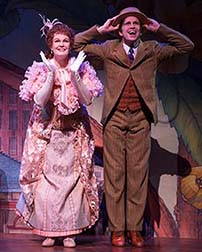
Lucy
Komisar
| “Hello
Dolly” and Bette Midler “Hello Dolly.”
Here’s a hit Broadway musical take on women and marriage in the mid-20th century, pre-second-wave feminism. First produced in 1964, starring Carol Channing, based on Thornton Wilder’s 1955 comedy “The Matchmaker,” this is about a woman, of middle years, in the turn of the last century in New York, whose job is arranging marriages. The plot comes from an 1835 British play. And she, Dolly Gallagher Levi (Bette Midler) – the name says a lot for her own openness — the widow of a guy she loved, is looking for a match for herself. In spite of her view that marriage is “a bribe to make the housekeeper think she is a householder.” Wilder’s line. Pretty advanced in the 50s. Betty Friedan territory. Turns out that the guy she is finding a wife for is the one she wants to marry. He’s a catch, because he has money. My first reaction is that Horace Vandergelder (David Hyde Pierce), the guy she wants for herself, is no great deal. In fact, I think as Pierce portrays him, he is obnoxious, even creepy. Why she would want him? The money, and this was in the 50s when women felt they didn’t have a lot of choice. Is this leading you to a major Broadway musical that takes that situation seriously? Well, suspend hope.
Vandergelder wants Irene Milloy (Kate Baldwin), a milliner, and a charmer. Irene wants Vandergelder to free her from life as a milliner. Baldwin shows her fine soprano in “Ribbons Down My Back.” But she is selling out for way down market. And she hasn’t done any due diligence. Forget about a life of ease. What he wants is a maid, a servant, as he proclaims to his workers and customers at his store:
“It Takes a Woman” is funny, but also raging sexism! What is wrong with these women? Why don’t I get a feeling in the play that they think twice about settling for this guy? Hat Shop employee Minnie Fay (the cute Beanie Feldstein) at least follows her heart. In line with his nasty persona, Vandergelder also mistreats the workers at his hay and feed store. They don’t get pay raises or even days off unless they inflict sabotage to make the shop unworkable. Gavin Creel is a charmer as the clever employee, Cornelius Hackl, who at 33 sees no way out. And, spoiler alert, Irene will get interested in Cornelius.
The strength of Jerry Zaks’ direction is the production numbers, with the often high-stepping and comical, even cartoonish, dancers. The playbill says original choreography by Gower Champion and [this production] choreographed by Warren Carlyle, so they share the artistry. I loved the terrific parade with suffragettes carrying women’s rights signs. It is the early 1900s. The message appears to have been lost on Dolly. I also detected a bit of political satire. Or more. Cornelius and his colleague hide in the closet of Irene’s shop when they spot Vandergelder arriving. And then Dolly shows up. The song to divert this apparently rightwing guy is “Motherhood.”
This jingoistic politics does not reappear, but it’s pretty interesting. Of course, this was a Sixties musical. Maybe lyricist Jerry Herman had a subtle message. The high-kicking waiters at the Harmonia Gardens are charming, but the “Hello Dolly” number where Bette Midler greets the staff is too schmaltzy. Midler is a disappointment as Dolly. She has style, but her voice is no longer great. And you don’t ever get a sense of who Dolly Gallagher Levi is. Isn’t there any conflict in her setting her feathered headdress on such a jerk as the feed store guy? She is much too over the top, even slapstick descending to sitcom to plain gross, drinking from a gravy boat and wolfing down a plate of candies, though that was the director’s call. Like the play, which could have been edgy, her acting is flat. Midler’s mugging is outclassed by the personality of a Channing or Streisand. The audience loved every starpower minute of it. |
| museums | NYTW mail | recordings | coupons | publications | classified |




